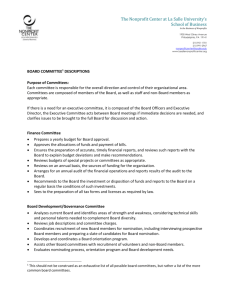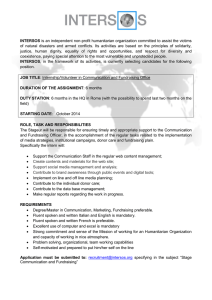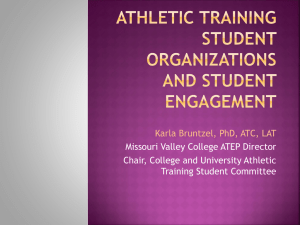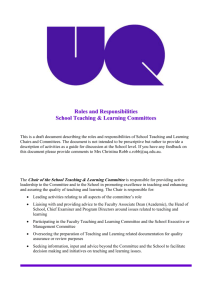Board Committee Job Descriptions 2
advertisement
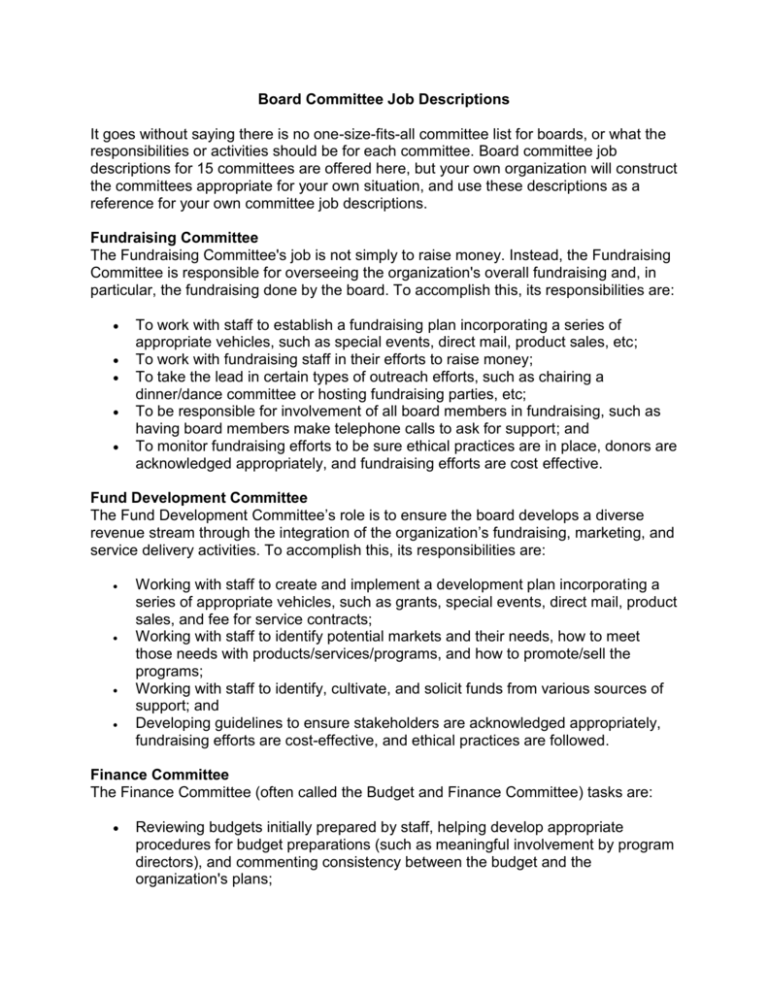
Board Committee Job Descriptions It goes without saying there is no one-size-fits-all committee list for boards, or what the responsibilities or activities should be for each committee. Board committee job descriptions for 15 committees are offered here, but your own organization will construct the committees appropriate for your own situation, and use these descriptions as a reference for your own committee job descriptions. Fundraising Committee The Fundraising Committee's job is not simply to raise money. Instead, the Fundraising Committee is responsible for overseeing the organization's overall fundraising and, in particular, the fundraising done by the board. To accomplish this, its responsibilities are: To work with staff to establish a fundraising plan incorporating a series of appropriate vehicles, such as special events, direct mail, product sales, etc; To work with fundraising staff in their efforts to raise money; To take the lead in certain types of outreach efforts, such as chairing a dinner/dance committee or hosting fundraising parties, etc; To be responsible for involvement of all board members in fundraising, such as having board members make telephone calls to ask for support; and To monitor fundraising efforts to be sure ethical practices are in place, donors are acknowledged appropriately, and fundraising efforts are cost effective. Fund Development Committee The Fund Development Committee’s role is to ensure the board develops a diverse revenue stream through the integration of the organization’s fundraising, marketing, and service delivery activities. To accomplish this, its responsibilities are: Working with staff to create and implement a development plan incorporating a series of appropriate vehicles, such as grants, special events, direct mail, product sales, and fee for service contracts; Working with staff to identify potential markets and their needs, how to meet those needs with products/services/programs, and how to promote/sell the programs; Working with staff to identify, cultivate, and solicit funds from various sources of support; and Developing guidelines to ensure stakeholders are acknowledged appropriately, fundraising efforts are cost-effective, and ethical practices are followed. Finance Committee The Finance Committee (often called the Budget and Finance Committee) tasks are: Reviewing budgets initially prepared by staff, helping develop appropriate procedures for budget preparations (such as meaningful involvement by program directors), and commenting consistency between the budget and the organization's plans; Reporting to the board any financial irregularities, concerns, or opportunities; Recommending financial guidelines to the board (such as establish a reserve fund or obtain a line of credit for a specified amount); Working with staff to design financial reports and ensure reports are accurate and timely; Overseeing short and long-term investments, unless there is a separate investments committee; Recommending selection of the auditor and working with the auditor, unless there is a separate audit committee; and Advising the executive director and other appropriate staff about financial priorities and information systems, depending on committee member expertise. -orFinance Committee The Finance Committee’s role is to oversee the fiscal affairs of the organization by ensuring the proper systems, procedures and controls are in place. Its tasks are: Developing appropriate procedures for budget preparations (such as meaningful involvement by program directors), reviewing budgets initially prepared by staff, and commenting on consistency between the budget and the organization's plans; Reporting to the board any financial irregularities, concerns, opportunities; Recommending financial guidelines to the board (such as establish a reserve fund or obtain a line of credit for a specified amount); Working with staff to design financial reports and ensure reports are accurate and timely; Overseeing short and long-term investments, unless there is a separate investments committee; Recommend selection of the auditor, working with the auditor, receiving auditor’s report, and responding to its recommendations, unless there is a separate audit committee; Review the terms and conditions of major grants and contracts; and Advising the executive director and other appropriate staff on financial priorities and information systems, depending on committee member expertise. Board Development Committee In some ways the most influential of all the committees, the Board Development Committee (sometimes called the Nominating Committee or the Committee on Trustees) is responsible for the general affairs of the board. While the specific tasks of this committee vary greatly from organization to organization, they usually include some or all of the following responsibilities: Preparing priorities for board composition; Meeting with prospective board members and recommending candidates to the board; Recommending a slate of officers to the board; Conducting orientation sessions for new board members and organizing training sessions for the entire board; and Suggesting new, non-board individuals for committee membership. Governance Committee The Governance Committee’s role is to look after the general affairs of the board by ensuring board processes, structures and roles are effective and by equipping each board member with the proper tools and motivation to carry out his and her responsibilities. These responsibilities include: Assess the board’s current composition and identify priorities for board composition; Recruit and cultivate prospective board members; Recommend candidates to the board; Recommend a slate of officers to the board; Conduct orientation sessions for new board members; Organize training sessions for the entire board; Suggest new, non-board individuals for committee membership; Develop job descriptions for board members; Assure the board regularly engages in self-assessment; Assure the board regularly engages in strategic planning; and Develop and apply guidelines for ensuring ethical behavior and resolving ethical conflicts. Program Committee The Program Committee is often comprised of board members who are most familiar with the approaches and operations of the organization's programs. (Some boards feel the organization’s program--its "products"--should be overseen by the entire board.) Depending on its make-up and programs, this committee's most common responsibilities are: Overseeing new program development, and monitoring and assessing existing programs; Initiating and guiding program evaluations; and Facilitating discussions about program priorities for the agency. Community Relations Committee The Community Relations Committee’s role is to ensure the board builds strong and strategic relationships with stakeholders through the integration of the organization’s education, public relations, and public policy activities. It achieves this by: Working with staff to develop a community relations plan that identifies formal and informal mechanisms to dialogue with the community; Working with staff to develop key messages articulated to stakeholders; Promoting the organization’s services to the community; Serving as a conduit for communicating with various media outlets; Working with staff to draft policy positions to share with elected officials; Developing criteria to identify and select collaborative partners; and Evaluating stakeholder relationships. Other Board Committees Executive Committee Sometimes an organization with a large board forms an Executive Committee, which is a smaller group that meets more frequently than the full board. Some Executive Committees are comprised of the board officers; others include committee chairs; and some choose other configurations, such as the board officers and the Fundraising Committee chair. A risk with Executive Committees is they may take over decisionmaking for the board, and other board members may feel they only rubber stamp decisions made by the Executive Committee. Audit Committee The role of the Audit Committee encompasses interviewing auditors, reviewing bids, recommending selection of an auditor to the board, receiving the auditor's report, meeting with the auditor, and responding to the auditor's recommendations. For many organizations, the annual audit is the only time the organization's financial systems are reviewed by an independent outsider, and as a result the auditor's report is an important mechanism for the board to obtain independent information about the organization's activities. On smaller boards, the functions of the Audit Committee are managed by the Finance Committee. Personnel Committee The functions of the Personnel Committee include drafting and/or revising personnel policies for board approval, reviewing job descriptions, establishing a salary structure, annually reviewing staff salaries, and reviewing the benefits package. In some organizations the board's Personnel Committee also acts as a grievance board for employee complaints. Because difficulties can arise if many less serious complaints are brought directly to the board rather than to the staff person's supervisor, it is preferable for the personnel committee to act only on formal written grievances against the executive director or when an employee formally appeals a decision by the executive director to the board. Public Policy Committee Organizations whose mission include public policy or education may create a Public Policy Committee that stays informed on relevant matters and brings proposals to the table for a board position or an organizational activity. For example, a Public Policy Committee might draft a written position paper related to pending cuts in welfare funding or propose the board join a coalition of neighborhood nonprofits protesting the closure of a park. Management Oversight Committee (for geographically distant boards) Boards in which members are geographically distant from one another have a difficult time keeping in touch with the work of the staff. The board may only meet twice a year or quarterly, and much of the contact among board members may be through e-mail or only with staff. To ensure financial and legal oversight between board meetings, some boards establish a Management Oversight Committee (MOC), which meets every 6 weeks and in which two of its three members live near the agency (the out-of-state member participates by phone). This committee has finance, audit, legal and personnel responsibilities which might be done by separate committees if the organization is large and working in only one city. The MOC provides a report on the organization's operations at each board meeting. Temporary Committees Some committees are convened on a temporary basis to address a specific, single event or issue. Often called ad hoc committees, they meet for a few months and then disband once their task is completed. Commonly used temporary committees and their designated tasks include: Site Committee: work with staff to evaluate the existing agency location and consider a move to a different location, review a new lease, or weigh the feasibility of purchasing a building; Special Event Committee: coordinate the board's assignments on a particular event, such as an annual dinner; CEO Transition or Search Committee: seek a new executive director, including recommend guidelines and a search process to the board and take steps to help the new executive succeed. Some search committees hire the new executive director, while other search committees present a group of candidates to be evaluated by a different committee or the whole board; Merger Committee: pursue a possible merger with another organization, and bring information and recommendations back to the full board; Planning Committee: lead a strategic planning endeavor (the planning committee may consist of both board and staff members); Special Issue Committee: investigate an unusual problem or opportunity, such as negative publicity in the newspaper, deep staff resentment against the executive director, an unusual grant opportunity or a possible joint project with another organization. Setting up a Special Issue Committee to research the situation and report back to the board ensures decisions are based on adequate information.
